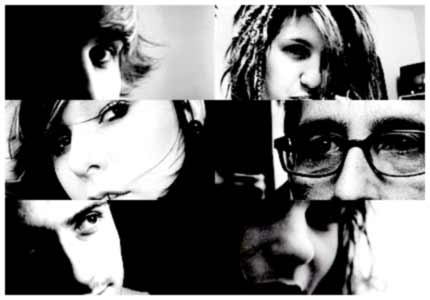 |
The Only Solace“ was referring to the production a very minimalist album - mainly vocals and guitars. And it sounds in my view – and I like the album very much for this - in some ways a bit caustic, snappy. What was the reason for this turn-around after “Immaculate Destruction” and what do you think about “The Only Solace” after some years?
“Immaculate Destruction” was, in hindsight, a low point for Ostara where I lost control of the direction of the music: that’s what sometimes happens in a band and Ostara should never have been a “band.” “The Only Solace” was almost another “rock” album until I pulled the plug on that idea and stripped everything back to its bare-boned roots, the songs as they had been written with a guitar and nothing else. I realized that it would be better to go it alone than sink into a mire of sonic self-dissolution. I rarely listen to past albums but I did listen to “The Only Solace” recently and was very pleased with it. It proved to me that less is sometimes more and that a voice and a guitar can sound more powerful than a four piece ensemble when the mood and the tone is right. For the last two albums you mainly worked alone. What is the difference for you or is there even any difference for you working alone or with former band members Timothy Jenn or Stu Mason? With Timothy there was always a strong affinity in terms of the lyrical and musical spirit of Ostara. He and I understood each other so there was a mutual sense of purpose until he basically lost the will to continue and committed musical suicide in 2002. With Stuart, I had attempted to find a replacement, someone who could fulfill a similar purpose as a guitarist but I had rather foolishly chosen to embrace a rock-oriented direction that was born out of a perceived need for something different. I have no regrets about doing this as I think it gave me a chance to try something new. Sometimes it is better to stray from the true path and recognize where the right way is rather than be too cautious and end up in a dead end. The true path for me now is a solitary one and that burden is quite liberating. So, the time between two albums now is much longer than in the early years of Ostara. Is there a turn in prioritization referring your life or is it more difficult for you to create an album? Music has always been a priority to me, except when I’m deliberately stepping back from it. The reason for the long delay was partly my decision to go solo, which meant a lot more investment in terms of time and energy. I also had a surplus of material that had to be edited and refined so the years just got consumed by the work. It was not difficult to conceive the songs but it was a painstaking process getting them to sound complete. What started out as a fairly simple folk record became a much more complicated project where every song, even the simpler ones, demanded a lot of attention, obsession and effort. With “Paradise Down South” the sound of Ostara in my view goes back to the times of “Secret Homeland” and “Kingdom Gone”. Do you agree and was there a plan to use more Keyboards and Drums again or was it a natural development for you? I agree. There was some nostalgia for those albums. I was rereading some of the early reviews of “Secret Homeland”, which divided opinion in terms of style because of its extensive use of real drums and ‘upbeat’ melodies. It was a new but shaky foundation and with “Kingdom Gone” we achieved something purer, stronger and more consistent. I think those were good days that unfortunately didn’t last due to Timothy’s sudden departure. I had to pull the whole thing back together and that took almost 7 years to achieve. The only difference is that I am now doing it alone and that, perhaps, was the secret to getting there. The picture of a “paradise down south” has often to do with e.g. a beach or a south sea island, or just let us say a garden Eden. Are you searching or hoping for a garden Eden in any kind - with or without a god. Or – facing the reality of human life - is there just cynicism left, because the snake with the forbidden fruit is everywhere? “Paradise Down South” has ambiguous connotations – it refers to my residence in Australia, a “paradise” down under that is also partly a desert where distances are vast and space is immense. Inwardly, however, it represents a descent into loneliness and the arid places of the heart, an infernal forge that is also a dark source of freedom. The serpent is a symbol of sin, of temptation but also of wisdom, the sinister and dangerous origins of desire, Eve as Lilith, the voluptuous siren in whom the secret of the world and all its pleasure, truth and terror is held. The forbidden is always the most delicious fruit but it is also what can so quickly turn into ashes, dust and despair. The Garden is both a sanctuary and a prison where winter and spring dwell side by side, the creative and destructive merged into one. I now live in a house walled in by a garden with a church wall on one side and a brick wall on the other. The prison is as real as it is a metaphor! One of the most eye-catching lyrics are “Debt On Credit”. It makes one think about the financial crisis of the USA, Europe or Japan and about money as a religion and infiltrator of morality or about shattered dreams. In this context I also think about Lloyd Blankfein, the CEO of Goldman Sachs who declared, that he is doing “God’s work”. So one may ask if we are still on the right way. Is it just misinterpretation or was there an impact on the lyrics? I did think of Goldman when I wrote that song, hence the lines, “sailing on a golden ray”, gold being the symbol of wealth, purity and splendor that is also the most corruptible and accursed form of power in both a material and spiritual sense. The thing about 2007 was that the gold was not just paper as it was in 1929 – it was virtual, a phantom form of liquidity that existed in the abstract, in a kind of anti-matter that dictated how the entire financial system operated as an exchange of debt used as credit. The aptly named Ponzi king, Bernie Madoff, who defrauded investors of 50 Billion dollars was just a small player in comparison to the corporate extortion of Goldman, Citibank, Bank of America, Meryl Lynch, Chase, Deutsche Bank, Lehman’s etc., whose speculative gambling on cheap credit made Las Vegas look like an amateur game of poker. Yet there was little or no prosecution of those responsible. The so-called free market that a manipulated financial system was set up to capitalize on remains intact – Goldman executives have been advising governments since the 1990s and continue to manage the byzantine financial web that they created to circulate the debt in the first place. Most people in the West today live on debt as credit, a borrowed future on which the instant gratification of an illusion of permanent affluence rests. The second part of the song deals with the pursuit of the radical alternatives to capitalism as manifested in the likes of Occupy and Zeitgeist, movements I actually felt a lot of empathy for at the time. But history shows that revolution can be as illusory as the delusion it seeks to replace. Apathy and antipathy are what prevail over idealism in a fractured web-centric world with little unity of purpose or mission. The other one is “Darkness Over Eden” where the first line “I must confess to you I secretly love America” seems to have an ironical undertone. Or do you mean “another”, a lost America? I think the lyrics show us that when we see an ideal world - and we like to see an ideal world - that it is more than possible that there already ruins lurk behind the curtain. It makes you also think about decisions made to late or wrong, because you are diverted by the ideal “show”-world. A problem we have to deal with in our times, I think. I actually have an ambivalent affection for America, not as a political or moral ideal but as a place where morality and idealism are confronted with their opposites, the grim shadow of the bright optimism that has always informed the American spirit. America is truly a place of dreams that has a powerful allure, even for those who profess to hate it. The idea of getting in a car and driving across the continent is as old as On the Road but it is also what made America what it is. Yet that sense of adventure spawned a ruthless pursuit of wealth and power that bred greed and violence on a massive scale. The idea that anyone can make it on his or her own and come from nowhere is a universal theme but it is especially pronounced in a country that actually lives and swears by that principle. I have travelled extensively across America, from the pleasant blandness of Orange County to the picturesque wreck of Detroit and the poor but stoically resilient villages of the Hopi Indians. I see in America an experiment in liberty that has created naïve blindness and incredible open-mindedness, extreme selfishness and amazing ingenuity. It is in America that Europe sees an inverted reflection of itself. As Rammstein said, “we all live in Amerika.” “Paradise Down South” is a kind of classic Apocalyptic-Folk Album. In the last years in my view there is a lack of new, really interesting bands in the genre. Do you think the idea is at least out of date? I think the genre has in some ways ceased to be a genre and has collapsed and exploded into other directions while retaining elements of the origins. I do like the work of survivors like Of the Wand and the Moon and Rome because they have developed their sound in a more sophisticated direction that has matured with age. The best is always few and far between. I am still fond of true folk acts like Changes and In Gowan Ring as well. Finally, there are a lot of people waiting for live gigs… I am planning a follow EP first, possibly on vinyl, before I venture back on stage. This is a personal decision that feels right for me at this time, especially as there is some ground to make up since Ostara has become a lone wolf act. But that time will come and I certainly look forward to it.
Tony F. für nonpop.de
Verweise zum Artikel: » OSTARA-Homepage Themenbezogene Artikel: » Mit OSTARA im schwarzen Turm - Interview » OSTARA: Napoleonic Blues » OSTARA: Paradise Down South » OSTARA: The Only Solace » Ostara - Immaculate Destruction » Ostara und Lux Interna im Alten Gut in Jena-Burgau Themenbezogene Newsmeldungen: » OSTARA mit neuem Album » Ostara sagen Schweiz- Konzert ab » Kostenloses Video von Ostara » Ostara - Immaculate Destruction
Namentlich gekennzeichnete Beiträge spiegeln ausschließlich die Meinung des jeweiligen Verfassers bzw. Interviewpartners wieder. Nachdruck (auch auszugsweise) nur mit schriftlicher Genehmigung durch den Betreiber dieser Seite.




|









